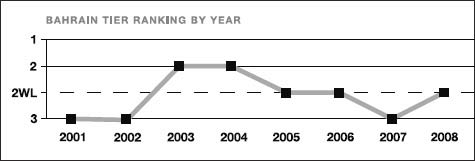Trafficking in Persons Report 2008 - Bahrain
| Publisher | United States Department of State |
| Author | Office to Monitor and Combat Trafficking in Persons |
| Publication Date | 4 June 2008 |
| Cite as | United States Department of State, Trafficking in Persons Report 2008 - Bahrain, 4 June 2008, available at: https://www.refworld.org/docid/484f9a0211.html [accessed 7 October 2022] |
| Disclaimer | This is not a UNHCR publication. UNHCR is not responsible for, nor does it necessarily endorse, its content. Any views expressed are solely those of the author or publisher and do not necessarily reflect those of UNHCR, the United Nations or its Member States. |
BAHRAIN (Tier 2 Watch List)
Bahrain is a destination country for men and women trafficked for the purposes of involuntary servitude and commercial sexual exploitation. Men and women from India, Pakistan, Nepal, Sri Lanka, Bangladesh, Indonesia, Thailand, the Philippines, Ethiopia, and Eritrea migrate voluntarily to Bahrain to work as laborers or domestic servants. Some, however, face conditions of involuntary servitude such as unlawful withholding of passports, restrictions on movements, non-payment of wages, threats, and physical or sexual abuse. In addition, women from Thailand, Morocco, Eastern Europe, and Central Asia are trafficked to Bahrain for the purpose of commercial sexual exploitation. The Thai government reported repatriating 368 Thai women who reported that they had been deceived or forced into prostitution in Bahrain.
The Government of Bahrain does not fully comply with the minimum standards for the elimination of trafficking, but is making significant efforts to do so. Nonetheless, Bahrain is placed on the Tier 2 Watch List for failing to show evidence of increased efforts to combat human trafficking, particularly efforts to enforce laws against trafficking in persons, and prevent the punishment of victims of trafficking. During this reporting period, Bahrain passed a comprehensive law prohibiting all forms of trafficking in persons. The government also established a specialized anti-trafficking unit within the Ministry of Interior to investigate trafficking crimes. The government, however, did not report any prosecutions or convictions for trafficking offenses during the year, despite reports of a substantial problem of involuntary servitude and sex trafficking.
Recommendations for Bahrain: Significantly increase law enforcement efforts against trafficking offenses, including arrest, prosecution, conviction, and punishment of traffickers; institute and apply formal procedures to identify and refer victims of trafficking to protective services; and ensure that victims of trafficking are not punished for acts committed as a result of being trafficked, such as illegal migration or prostitution.
Prosecution
During the year, Bahrain made progress in law enforcement against trafficking crimes. In January, Bahrain enacted a comprehensive law prohibiting all forms of trafficking in persons and prescribing standard penalties ranging from three to 15 years' imprisonment, which are sufficiently stringent and commensurate with those prescribed for other grave crimes, such as rape. A finding of aggravating circumstances, such as victimization of a minor or a female, may result in a sentence up to and including life imprisonment. The government also established a specialized unit within the Ministry of Interior to investigate trafficking crimes – particularly sex trafficking – in November. Nonetheless, the government did not report any arrests, prosecutions, convictions, or punishments for trafficking offenses under the anti-trafficking law or other available statutes. The law against withholding workers' passports – a common practice that restricts the mobility of migrant workers – was not enforced effectively, and the practice remained widespread.
Protection
Bahrain took limited measures to improve protection of trafficking victims during the reporting period. Between April 2007 and February 2008, the government-run shelter for victims of trafficking offered legal assistance to 45 foreign workers, the majority of whom made allegations of physical abuse by their employers. In July, two female victims of sex trafficking, one Ukrainian and one Russian, received shelter and repatriation services from the government. The majority of victims, however, continued to seek shelter at their embassies or through NGOs providing victim protection services. Local NGOs supporting trafficking victims in informal shelters did not receive any government funding. Though police and prosecutors received training on identification and protection of trafficking victims, the government continued to lack a formal procedure to identify victims among vulnerable groups, such as runaway domestic workers or women arrested for prostitution. As a result, some victims were detained and deported without adequate protection. In cases of physical, sexual, or psychological abuse, authorities reportedly referred victims to the government shelter; however, if there was an indication of misconduct on the part of the foreign worker, the worker was deported. Because employers often filed false police reports against their runaway workers, some victims of trafficking may have been punished rather than protected. The government did not discourage victims to assist in the prosecution of their traffickers; however, long and indefinite delays in legal cases, as well as a perceived bias against foreign workers by judges and prosecutors, discouraged workers from participating in prosecutions against their traffickers.
Prevention
Bahrain made some efforts to prevent trafficking in persons this year. The government initiated a campaign to prevent the selling of blank work permits – a practice which makes migrant workers vulnerable to trafficking – by allowing employers only to request non-transferable worker visas for pre-identified employees in connection with specific jobs. The government also continued to distribute multilingual brochures on workers' rights and resources to incoming workers. Nonetheless, the government did not take any steps to reduce the demand for commercial sex acts. Similarly, the government did not institute a public awareness campaign targeting citizens traveling to known child sex tourism destinations.

